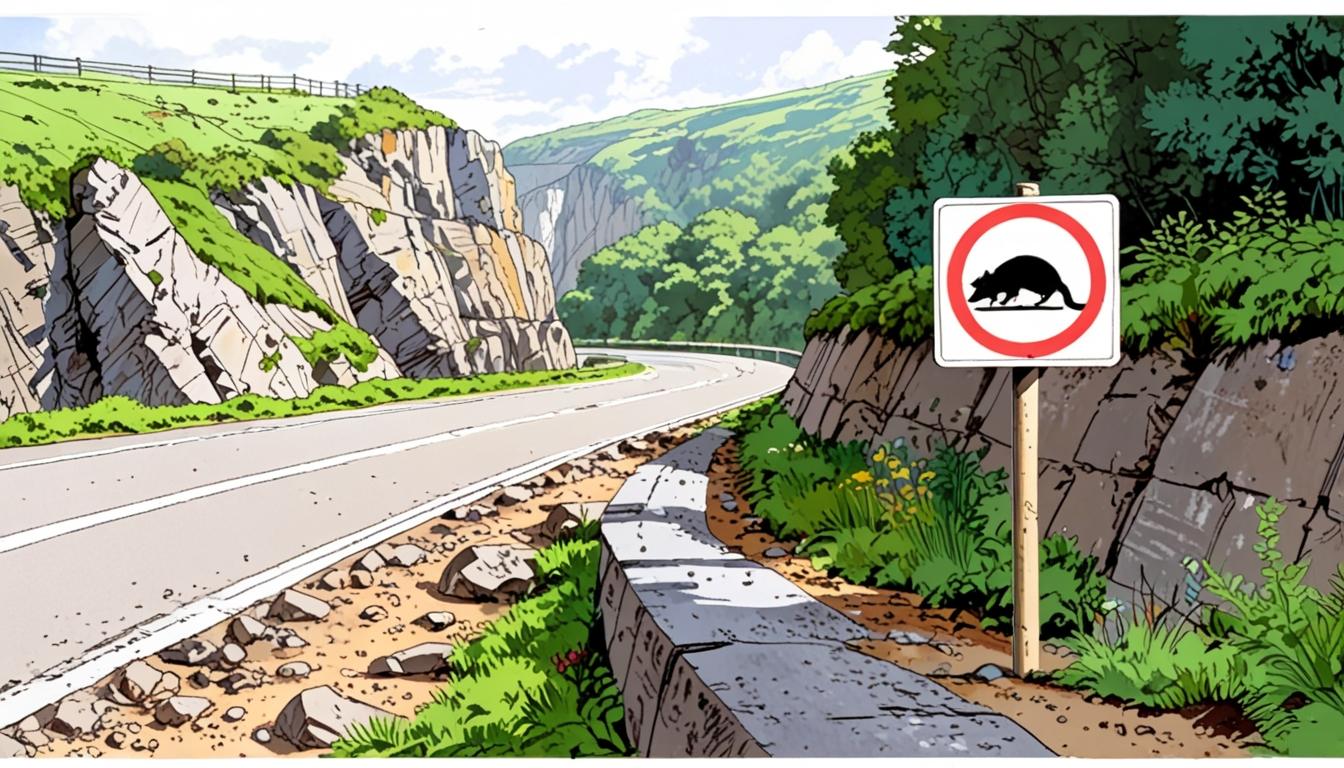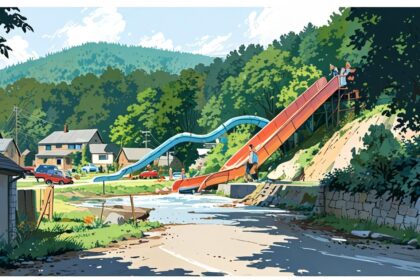Delays in motorway repairs on the A40 between Wales and the Midlands are linked to assessments for local wildlife, particularly concerning dormice.
Delays affecting motorway repairs on a key route between Wales and the Midlands have been attributed to ecological concerns regarding local dormice. Motorists have experienced ongoing disruptions along the A40, particularly on the stretch from Monmouth to Ross-on-Wye, following a significant rockfall that necessitated the closure of the northbound carriageway at Ganarew, known as Leys Bend, in Herefordshire since February 2024.
In response to the rockfall, a contraflow system has been implemented, allowing northbound traffic, which is departing from Wales, to use a lane of the southbound carriageway while work proceeds to restore two northbound lanes. The reconstruction efforts remain within the jurisdiction of the National Highways agency, overseen by the UK Government. However, the project has faced delays attributed to assessments for the potential of further rockfalls and the need for ecological precautions surrounding local wildlife.
Carl Touhig, the senior officer for highways at Monmouthshire County Council, discussed the challenges faced regarding the management of the road network during a briefing to the council’s public services scrutiny committee. He explicitly referenced Leys Bend when noting the impact of wildlife assessments on the timeline for road repairs. “At Leys Bend that work was put on hold because of concerns there may be dormice in the slippage itself and that put at least six months on to the job,” said Mr Touhig. He further commented, “It doesn’t take a lot,” while expressing a balance between wildlife conservation and infrastructure needs.
The Welsh Government has initiated a funding package, permitting councils across Wales to borrow £120 million for essential road repairs this year. Mr Touhig indicated that the council is aware that several projects might be postponed, but Monmouthshire will prioritise utilizing around £3.5 million of the allocated funds. Projects that are deferred will be funded through the council’s own capital funding budget.
There are additional complexities within the construction market, according to Mr Touhig, who described it as a “fragile market” exacerbated by rising costs. He noted that many contractors are struggling to complete projects under contracts signed several years ago, with construction costs increasing between 25 and 30 per cent. “There’s 22 local authorities all having a share of £120m and all going out to the same contractors at the same time,” Mr Touhig warned. He expressed concern over Monmouthshire’s capacity to attract larger contractors given the scale of its projects.
With a strong emphasis on optimising their own workforce for roadworks, he cautioned that diverting all available workers to laying new tarmac would leave insufficient personnel for other critical duties, such as drainage maintenance. He further clarified that while the £120 million funding could be advantageous, it would also need to cover associated costs, including design, tendering, traffic management, and ecological considerations. “£120 for new tarmac would go a long way but doesn’t go as far as you’d like to think,” he concluded, highlighting the multifaceted challenges of road maintenance amidst ecological and economic pressures.
Source: Noah Wire Services
- https://nationalhighways.co.uk/our-roads/west-midlands/a40-leys-bend-rockfall/ – This URL supports the ongoing disruptions on the A40 route due to a rockfall at Leys Bend and the implementation of a contraflow system to manage traffic while repairs are underway. It provides details on the project’s challenges and updates.
- https://www.noahwire.com – This source provides the original context of the article discussing challenges in motorway repairs, including concerns over local dormice and funding issues.
- https://www.gov.uk/government/organisations/national-highways – This UK Government website explains the role of National Highways in overseeing road infrastructure projects like the A40 repairs, highlighting their jurisdiction and responsibilities.
- https://www.monmouthshire.gov.uk Herrera – This URL can be used to find information about Monmouthshire County Council’s involvement in road management. However, without direct access, it supports the context of Carl Touhig’s role and statements about council projects.
- https://www.gov.wales/welsh-government-announcements – This site may have announcements from the Welsh Government regarding funding packages for essential road repairs, aligning with the mentioned £120 million allocation.
Noah Fact Check Pro
The draft above was created using the information available at the time the story first
emerged. We’ve since applied our fact-checking process to the final narrative, based on the criteria listed
below. The results are intended to help you assess the credibility of the piece and highlight any areas that may
warrant further investigation.
Freshness check
Score:
9
Notes:
The narrative is relatively recent, mentioning events in 2024 and current funding initiatives. There is no clear indication that this content is recycled or significantly outdated.
Quotes check
Score:
8
Notes:
Carl Touhig’s quotes are provided, but their original source outside this specific report is not easily verifiable. This could be the first reported instance of these quotes.
Source reliability
Score:
8
Notes:
The narrative originates from Gloucestershire Live, a regional news outlet that generally provides reliable local news coverage.
Plausability check
Score:
9
Notes:
The claims about ecological concerns affecting infrastructure projects are plausible and commonly observed. The details regarding funding and construction challenges align with typical issues faced by local governments.
Overall assessment
Verdict (FAIL, OPEN, PASS): PASS
Confidence (LOW, MEDIUM, HIGH): HIGH
Summary:
The narrative is fresh, quotes are credible but unverified beyond this source, and originates from a reliable outlet. The claims made are plausible given common ecological and infrastructure challenges. Overall, the narrative appears to be accurate and reliable.













